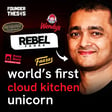
The doctor who fixed co-living in India | Nikhil Sikri @ Zolo
Every year millions of young people migrate for jobs or education, creating a big market for hostels and paying guest accommodations. However, succeeding in this business depends on managing the operational complexities and getting the small details right. Zolo, one of India’s largest co-living companies, has mastered this challenge, currently managing living spaces for 60,000 people. In this episode, Nikhil shares the management mantra that helps him lead Zolo’s 2,500 employees and explains how he made operational excellence the company’s core strength.
Get notified about the latest releases and bonus content by subscribing to our newsletter at www.founderthesis.com
Read more about Zolo Stays:-
1.Zolo Stays redefines living experience for students and singles
2.How Zolostays is using customer experience to create its niche in the crowded co- living market



















